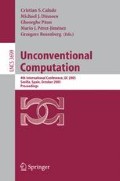Abstract
It is an unconventional computation approach to evolve solutions instead of calculating them. Although using evolutionary computation in computer science dates back to the 1960s, using an evolutionary approach to program other algorithms is not that well known. In this paper a genetic algorithm is used to evolve behavior in cellular automata. It shows how this approach works for different topologies and neighborhood shapes. Some different one dimensional neighborhood shapes are investigated with the genetic algorithm and yield surprisingly good results.
Access this chapter
Tax calculation will be finalised at checkout
Purchases are for personal use only
Preview
Unable to display preview. Download preview PDF.
References
Bäck, T., Fogel, D.B., Michalewicz, Z. (eds.): Handbook of Evolutionary Computation. Oxford University Press and Institute of Physics Publishing, New York (1997)
Bäck, T., Breukelaar, R., Willmes, L.: Inverse design of cellular automata by genetic algorithms: an unconventional programming paradigm. In: UPP proceedings in the ’Hot Topics’. LNCS (2005)
Breukelaar, R., Bäck, T.: Evolving transition rules for multi dimensional cellular automata. In: 6th International Conference on Cellular Automata for Research and Industry, ACRI, Amsterdam, The Netherlands. Springer, Heidelberg (2004)
Breukelaar, R., Bäck, T.: Using a genetic algorithm to evolve behavior in multi dimensional cellular automata. In: GECCO proceedings (2005) (to be published)
David, A., Forest, B., Koza, H.: Discovery by genetic programming of a cellular automata rule that is better than any known rule for the majority classification problem (1996)
Fogel, D.B.: Evolutionary Computation: Toward a New Philosophy of Machine Intelligence. IEEE Press, New York (1995)
Fogel, L., Owens, A., Walsh, M.: Artificial Intelligence through Simulated Evolution. John Wiley and Sons, Chichester (1966)
Gacs, P., Kurdyumov, G.L., Levin, L.A.: One dimensional uniform arrays that wash out finite islands. Problemy Peredachi Informatsii (1978)
Goldberg, D.E.: Genetic Algorithms in Search, Optimization and Machine Learning. Addison-Wesley, Reading (1989)
Goldberg, D.E.: The Design of Invocation:Lessons from and for Competent Genetic Algorithms. Kluwer Academic Publishers, Dordrecht (2002)
Holland, J.H.: Adaptation in Natural and Artificial Systems. The University of Michigan Press, Ann Arbor (1975)
Koza, J.R.: Genetic Programming: On the Programming of Computers by Natural Selection. MIT Press, Cambridge (1992)
Koza, J.R., Keane, M.A., Streeter, M.J., Mydlowec, W., Yu, J., Lanza, G.: Genetic Programming IV: Routine Human-Competitive Machine Intelligence. Kluwer Academic Publishers, Dordrecht (2003)
Mitchell, M., Crutchfield, J.P.: The evolution of emergent computation. Technical report, Proceedings of the National Academy of Sciences, SFI Technical Report 94-03-012 (1994)
Mitchell, M., Crutchfield, J.P., Hraber, P.T.: Evolving cellular automata to perform computations: Mechanisms and impediments. Physica D 75, 361–391 (1994)
Rechenberg, I.: Evolutionsstrategie: Optimierung technischer Systeme nach Prinzipien der biologischen Evolution. Fromman-Holzboog Verlag, Stuttgart (1973)
Rechenberg, I.: Evolutionsstrategie 1994. Fromman-Holzboog Verlag, Stuttgart (1994)
Schwefel, H.P.: Numerische optimierung von computer-modellen mittels der evolutionsstrategie. Interdisciplinary Systems Research 26 (1977)
Schwefel, H.P.: Evolution and Optimum Seeking. Wiley, New York (1995)
Wolfram, S.: Statistical mechanics of cellular automata. Reviews of Modern Physics 55 (1983)
Author information
Authors and Affiliations
Editor information
Editors and Affiliations
Rights and permissions
Copyright information
© 2005 Springer-Verlag Berlin Heidelberg
About this paper
Cite this paper
Bäck, T., Breukelaar, R. (2005). Using Genetic Algorithms to Evolve Behavior in Cellular Automata. In: Calude, C.S., Dinneen, M.J., Păun, G., Pérez-Jímenez, M.J., Rozenberg, G. (eds) Unconventional Computation. UC 2005. Lecture Notes in Computer Science, vol 3699. Springer, Berlin, Heidelberg. https://doi.org/10.1007/11560319_1
Download citation
DOI: https://doi.org/10.1007/11560319_1
Publisher Name: Springer, Berlin, Heidelberg
Print ISBN: 978-3-540-29100-8
Online ISBN: 978-3-540-32022-7
eBook Packages: Computer ScienceComputer Science (R0)

